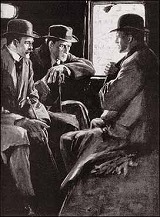“We may form some conception as to the motives of the crime. It is, as I gather from your original remarks, an inexplicable, or at least an unexplained, murder. Now, presuming that the source of the crime is as we suspect it to be, there might be two different motives. In the first place, I may tell you that Moriarty rules with a rod of iron over his people. His discipline is tremendous. There is only one punishment in his code. It is death. Now we might suppose that this murdered man - this Douglas whose approaching fate was known by one of the arch-criminal’s subordinates - had in some way betrayed the chief. His punishment followed, and would be known to all - if only to put the fear of death into them.”
“Well, that is one suggestion, Mr. Holmes.”
“The other is that it has been engineered by Moriarty in the ordinary course of business. Was there any robbery?”
“I have not heard.”
“If so, it would, of course, be against the first hypothesis and in favour of the second. Moriarty may have been engaged to engineer it on a promise of part spoils, or he may have been paid so much down to manage it. Either is possible. But whichever it may be, or if it is some third combination, it is down at Birlstone that we must seek the solution. I know our man too well to suppose that he has left anything up here which may lead us to him.”
“Then to Birlstone we must go!” cried MacDonald, jumping from his chair. “My word! it’s later than I thought. I can give you, gentlemen, five minutes for preparation, and that is all.”
“And ample for us both,” said Holmes, as he sprang up and hastened to change from his dressing gown to his coat. “While we are on our way, Mr. Mac, I will ask you to be good enough to tell me all about it.”
“All about it” proved to be disappointingly little, and yet there was enough to assure us that the case before us might well be worthy of the expert’s closest attention. He brightened and rubbed his thin hands together as he listened to the meagre but remarkable details. A long series of sterile weeks lay behind us, and here at last there was a fitting object for those remarkable powers which, like all special gifts, become irksome to their owner when they are not in use. That razor brain blunted and rusted with inaction.

Sherlock Holmes’s eyes glistened, his pale cheeks took a warmer hue, and his whole eager face shone with an inward light when the call for work reached him. Leaning forward in the cab, he listened intently to MacDonald’s short sketch of the problem which awaited us in Sussex. The inspector was himself dependent, as he explained to us, upon a scribbled account forwarded to him by the milk train in the early hours of the morning. White Mason, the local officer, was a personal friend, and hence MacDonald had been notified much more promptly than is usual at Scotland Yard when provincials need their assistance. It is a very cold scent upon which the Metropolitan expert is generally asked to run.
“DEAR INSPECTOR MACDONALD [said the letter which he read to us]:
“Official requisition for your services is in separate envelope. This is for your private eye. Wire me what train in the morning you can get for Birlstone, and I will meet it - or have it met if I am too occupied. This case is a snorter. Don’t waste a moment in getting started. If you can bring Mr. Holmes, please do so; for he will find something after his own heart. We would think the whole thing had been fixed up for theatrical effect if there wasn’t a dead man in the middle of it. My word! it is a snorter.”
“Your friend seems to be no fool,” remarked Holmes.
“No, sir, White Mason is a very live man, if I am any judge.”
“Well, have you anything more?”